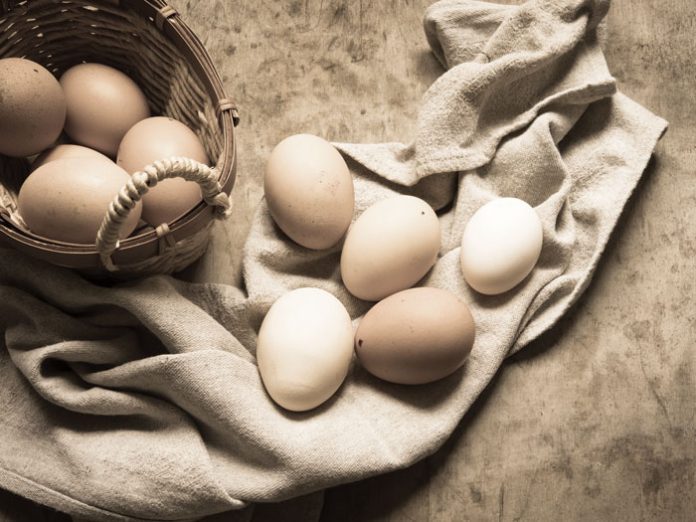I turn off Brook Road in Lakewood onto Old Brook Road, where a landmark yellow sign marks the entrance to E. J. Schuster’s Discount Office Furniture & Poultry Farm. I’ve driven down Brook Road countless times, and I’ve always been curious about the history of this place. I buy Schuster’s Farm Fresh eggs, in the gray carton. But eggs and office furniture? And how long has that yellow sign stood there?
And now, with the recent news about the salmonella outbreak in eggs, I finally have a reason to visit—to learn more about the egg industry and the source of our food. But before I learn about the mass production of today’s eggs—and the possible causes of the salmonella outbreak—we’re going to go on a little detour.
It’s an important and fascinating detour into the rich legacy of the New Jersey egg. The story begins in 1943 right here in Lakewood, the same year that Rav Aharon Kotler, zt”l, arrived in Lakewood and founded Bais Medrash Govoha. It was then that Norbert Schuster and his wife, Berta, also arrived in Lakewood and began working at a farm just down the block on Brook Road, between East 7th/Ridge and County Line Road.
Lakewood was part of the rural countryside in those days, and Eddie J. Schuster, Norbert’s son, whom I’m meeting today, tells me that in those days, everyone in Lakewood knew each other. “If you were driving down County Line Road, you waved to the car that was passing in the other direction, because you always knew the person in the other car.”
Norbert Schuster used to harvest and distribute the eggs, and his wife would clean, weigh, and candle each egg individually by hand, before they were placed in cartons and loaded into Norbert’s car for distribution to the local grocery stores.
But the story—and the reason the Schusters ended up in rural Lakewood rather than in New York’s Washington Heights neighborhood, where most German Jews who had escaped Nazi Germany had emigrated—goes a little further back.
Before and at the onset of World War II, the Schuster family lived in the small town of Sterbfritz in rural Germany, where all the farmers were friendly with each other. The day finally came when SS officers arrived in Sterbfritz searching for Norbert Schuster.
“My father was being chased by the Nazis, and he ran into the fields. He knew the countryside well, and he knew all the people in the area; he had grown up with them. He passed a shepherd he knew and said to him, ‘The Nazis are chasing me!’ The shepherd told him, ‘Lie down over there,’ and he gathered the flock of sheep around him. When the SS officers approached the shepherd and asked him if he had seen a Jew, the shepherd replied, ‘No—perhaps he ran over that hill over there, but there are no Jews here.’”
The Schusters eventually escaped Germany in an SS car that took them over the border into Switzerland and then made their way to Genoa, Italy, where they boarded a boat headed to America.
“My uncle was already living here, so he was able to get them tickets,” Eddie tells me.
“How did they escape in an SS car?” I ask him.
“I never asked. There are a lot of things I should have asked. That was one of them,” he says.
The Schusters spent a year and a half in New York, and Norbert worked in the city. But he didn’t like it. He was accustomed to the countryside, so in 1943, the family moved south to Lakewood.
“Between 1943 and 1946, my father worked on the farm. But then the person who owned the farm said he didn’t need it anymore. He wanted to sell it to my father. My father didn’t have money to buy a farm, but the owner said, ‘Don’t worry, we’ll work it out,’ and they did.”
From the time Norbert Schuster arrived in Lakewood, in addition to raising chickens for eggs, he also raised sheep; he had hakaras hatov to the sheep for saving his life back in Germany. The original Schuster Poultry Farm is still in its first location on Brook Road, and the property goes back all the way to Mt. Sinai Jewish Cemetery. If you look to your right while driving by (coming from County Line), you can see a flock of sheep grazing in the field. Today, Eddie’s son Robert still takes care of a herd of about 20 sheep on the farm, in addition to other animals, out of respect for his grandfather.
When Eddie was a little boy, he played with the sheep and lambs and gave them all names. He didn’t like it when a lamb was sold for its meat. “They were my friends!” he tells me.
“My family would feed the chickens by hand, gather the eggs by hand, and then clean the eggs by hand. Not every egg was dirty, but if it was, it had to be cleaned since no one wants a dirty egg. My mother cleaned the eggs in the basement and then weighed each one, so they could be categorized and sorted into small, medium, large, extra large, and jumbo containers. The eggs also had to be candled to check the insides and make sure there were no cracks, blood spots, or defects.”
“That wasn’t still done with a candle, right?”





















